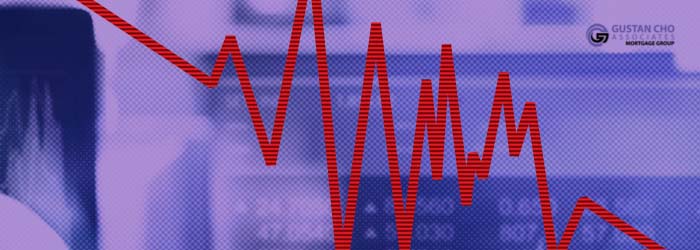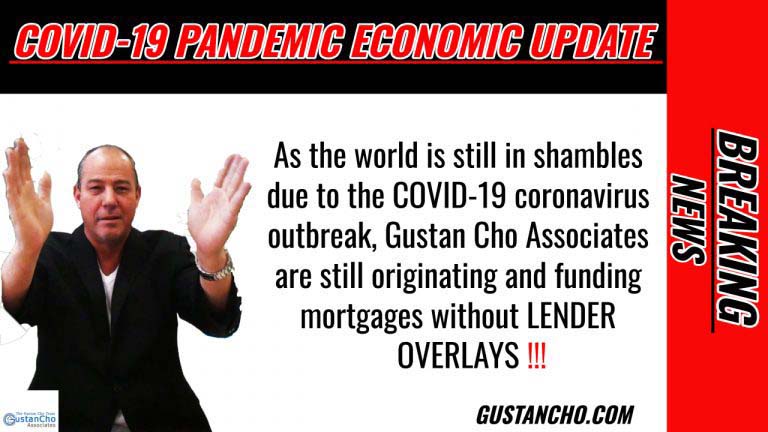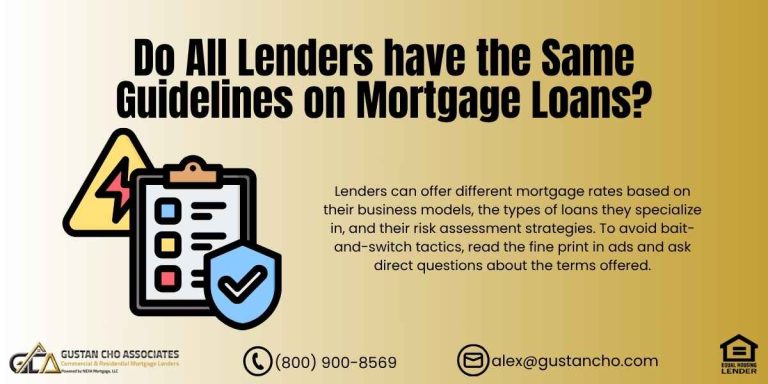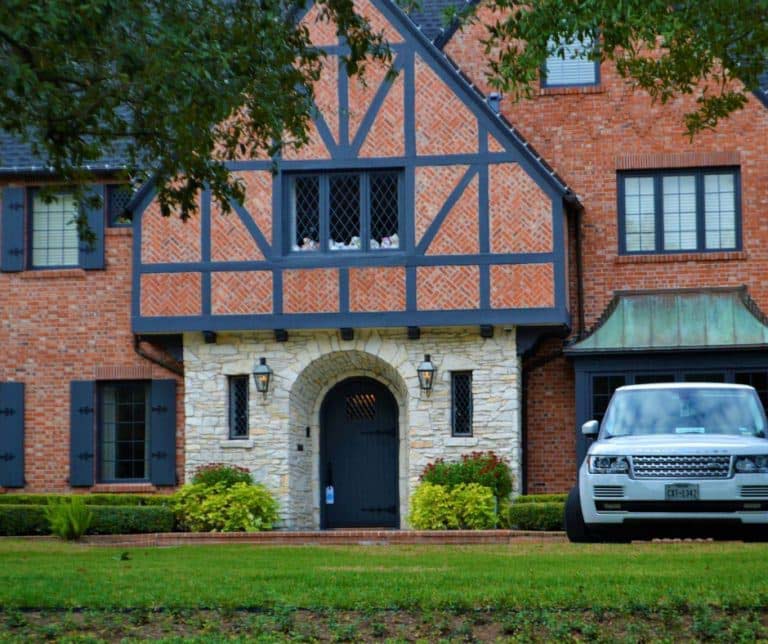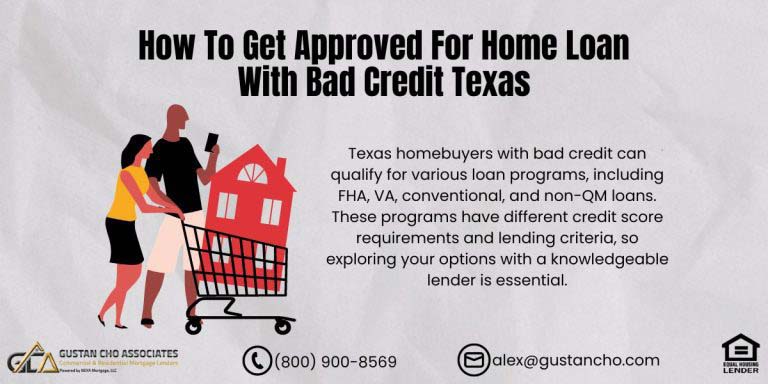BREAKING NEWS: Mortgage Pre-Approval During The COVID-19 Pandemic Crisis
Obstacles And Changes On Mortgage Pre-Approval During The COVID-19 Pandemic Crisis:
- If you have been following Gustan Cho Associates, you know the mortgage industry is rapidly changing due to the COVID-19 coronavirus outbreak
- With over 40 million Americans out of work, it has become tougher than ever to get pre-approved for a mortgage loan
- While most lenders have raised their minimum credit score requirements, we are happy to inform our readers that we have not
- We still offer mortgage lending without LENDER OVERLAYS in most states
- In this blog, we will detail the pre-approval process during these unprecedented times and a few key items that have changed
Stress With Mortgage Pre-Approval During The COVID-19 Pandemic Crisis
Getting pre-approved for a mortgage can be the most stressful part of the mortgage process. There are many issues that can arise during the beginning phase of the process. During this stage, you do some of the most work, gathering documents, and completing the application. Depending on your credit score, credit history, and down payment requirement, your pre-approval can be a smooth process. However, if you do have credit challenges from the past, this process may be a bit more complicated.
If you are in the early stages of buying a home, we encourage you to call Gustan Cho Associates. We offer all our loan programs without additional lender overlays. This allows us to help more clients than most lenders. Even if you have been turned down in the past, this may be a good time to start the homebuying process again.
Loan Process On Mortgage Pre-Approval During The COVID-19 Pandemic
A quick rundown on the pre-approval process:
- The first step is to call Mike Gracz on (800) 900-8569 or send an email to gcho@gustancho.com
- After you provide your contact information, you and Mike will have a brief one on one conversation about your mortgage needs and qualifications
- After going over your goals, Mike will pair you with a licensed loan officer in your state
- Your assigned loan officer will send you an application link
After completing the application link out, you will need to send in the following documentation:
- Last 60 Days Bank Statements – to source money for escrows
- Last 30 Days Pay Stubs
- Last Two Years W2’S
- Last Two Years Tax Returns
- Driver’s License
Qualification Process Prior To Mortgage Pre-Approval During The COVID-19 Pandemic Crisis
Once your loan officer receives your application and your documentation, they will then verify your credit report. Depending on what items are on the credit report will determine what you are preapproved for Your loan officer will work backward based on your qualifying income and debts reported The loan officer but then run your file through an automated underwriting system depending on the loan program requested
This automated underwriting system or AUS will provide the lender with more information This will determine whether you are eligible for automated approval or must be downgraded to a manual underwrite. Either way, we are the experts in manually underwriting mortgage loans. Please see our AUS BLOG for more information.
Economic Impact Affecting Mortgage Markets
Things to look out for due to the COVID-19 coronavirus outbreak. This outbreak has affected almost every industry worldwide in the United States mortgage market has also taken a massive hit. With unemployment high, the economy in shambles, and the current status of the American people, has caused interest rates to drop to nearly all-time lows.
One thing you want to avoid is making sure you are able to close your loan during the rate lock period requested. If you request a 30-day lock, but your loan takes 45 days to close, you will need to pay a 15-day rate lock extension. It is important to lock your rate only when you know you will close within the timeframe of the rate lock agreement. Underwriting turn times are slow right now. This is due to the increased value for mortgage applications and the fact that many operation staff is still working from home nationwide. Make sure you are talking about these items with your loan officer.
Shopping For Homes Via Virtual Home Tours
Virtual home tours:
- Virtual tours have been more common due to the COVID-19 coronavirus outbreak
- This outbreak has caused mass hysteria through the real estate community
- Many realtors are apprehensive to have showings and open houses are not allowed in most states
- It is common to start with a virtual tour and narrow your search down
- I do not recommend buying a house based on a virtual tour alone because it is easy to enhance photos to hide blemishes throughout the property
- Realtors now more than ever need a strong pre-approval letter before they will show you a property
- Many agents will follow up with the lender on your pre-approval letter before scheduling a showing with you
They want to make sure that the borrower is truly pre-approved and there will not be any issues during the transaction.
Verification Of Employment During The COVID-19 Pandemic Mortgage Process
- A lender must verify the previous two years of your employment before issuing an approval
- This has been an issue for many borrowers since the COVID-19 outbreak hits
- Many companies and institutions are currently closed or working remotely
- This can make it a nightmare to track down the necessary information
- If you are starting the home buying process, please send your lender information for your human resources or payroll department
- Having exact contact information will speed up the process
We cannot close your mortgage transaction without an executed verification of employment.
Qualifying For A Mortgage With No Lender Overlays During The COVID-19 Pandemic
Besides a few tweaks here and there, the pre-approval process is not much different than before this outbreak hit. Just like every aspect of our life, we are learning to adjust. The home buying process will go back to normal in the future. But for now, we have a few hurdles that we must jump over together. For more information or to get pre-approved, please call Mike Gracz on (800) 900-8569. You may also email your scenario to gcho@gustancho.com. Over 75% of our clients have been turned down by their current lender. We are here to help. Even if you do not qualify for a mortgage loan today, we will point you in the right direction to achieve a pre-approval letter as soon as possible. We look forward to hearing from you.
Hurdles With Applying For A Mortgage During The COVID-19 Pandemic On Non-QM Loans
Non-QM loans are one of the most popular loan programs. Non-QM mortgages were shut down for the past three months. Gustan Cho Associates just reopened Non-QM lending in the past two weeks. However, credit and debt to income ratio standards are now higher than prior to the pandemic. Prior to the pandemic, we had non-QM loans for borrowers with credit scores down to 500 FICO. However, borrowers need at least a 680 credit score to qualify for Non-QM mortgages. Prior to the pandemic, there were 10% down payment non-QM mortgage programs. Now, the minimum down payment required on Non-QM loans is 20%. If borrowers want the best mortgage rates on Non-QM loans, they need at least a 30% down payment and credit scores north of 740 FICO. We expect more lenient lending guidelines on Non-QM loans in the weeks and months to come. There is no mandatory waiting period after bankruptcy and foreclosure with Non-QM mortgages. There are no maximum loan limits. There is no private mortgage insurance required on Non-QM loans.
The CARES Act Created Uncertainty In The Mortgage Bond Markets
Included in the CARES Act was the right for unemployed homeowners to be eligible for forbearance on federally-backed mortgages. What this means is any homeowner with an FHA, VA, USDA, Fannie Mae, Freddie Mac mortgage can be eligible for mortgage forbearance for up to one year. What this means is homeowners do not have to make any payments for a certain period of time up to one year. However, after the forbearance period is over, the borrower needs to make all payments.
Lenders can spread out mortgage payments over a period of time to make it affordable. Forbearance is not forgiveness. All missed payments, including escrow shortage, needs to be paid to the lender. The issue here is mortgage servicers are still on the hook in paying the investor. This holds true even though borrowers are not making mortgage payments to mortgage servicers. The coronavirus pandemic devastated the U.S. economy. Over 41 million Americans filed unemployment claims. 41 million Americans are one-quarter of the U.S. workforce. Without a federal bailout, many mortgage servicers are expected to shut their doors and/or file bankruptcy. This has created a panic in the secondary mortgage bond markets.
Investors currently have no appetite in buying mortgages from borrowers with under 700 credit scores. There is no liquidity in the secondary mortgage bond market. Lenders across the board have tightened their lending overlays on government and conventional loans. Lenders instruct mortgage underwriters to be super careful and anal when underwriting a loan. Mortgage underwriters are ultra-careful when underwriting mortgages. It takes twice as long to underwrite a file during the coronavirus pandemic due to fear the loan may not be able to sell on the secondary market after it funds.
If the secondary mortgage bond market does not purchase a loan after it funds, lenders are stuck with the loan for the duration of the 30-year term. Or they need to sell it as a scratch and dent mortgage at a huge discount. This frightens the lender. This is the reason why lenders are instructing mortgage underwriters to be super careful when underwriting. It normally takes 45 to 60 days to close a mortgage during the COVID-19 pandemic. Prior to the pandemic, most loans closed in 30 days or less.



